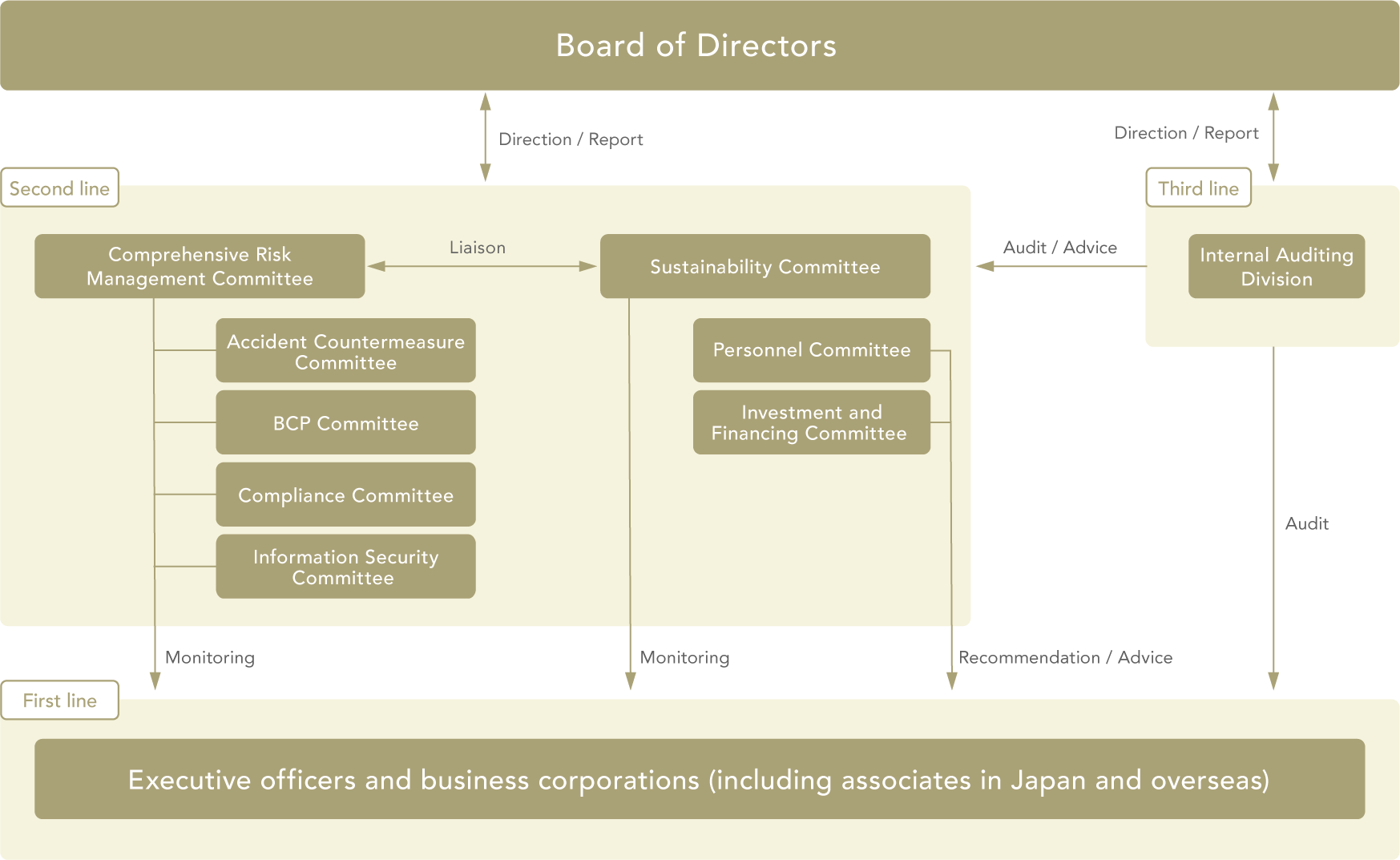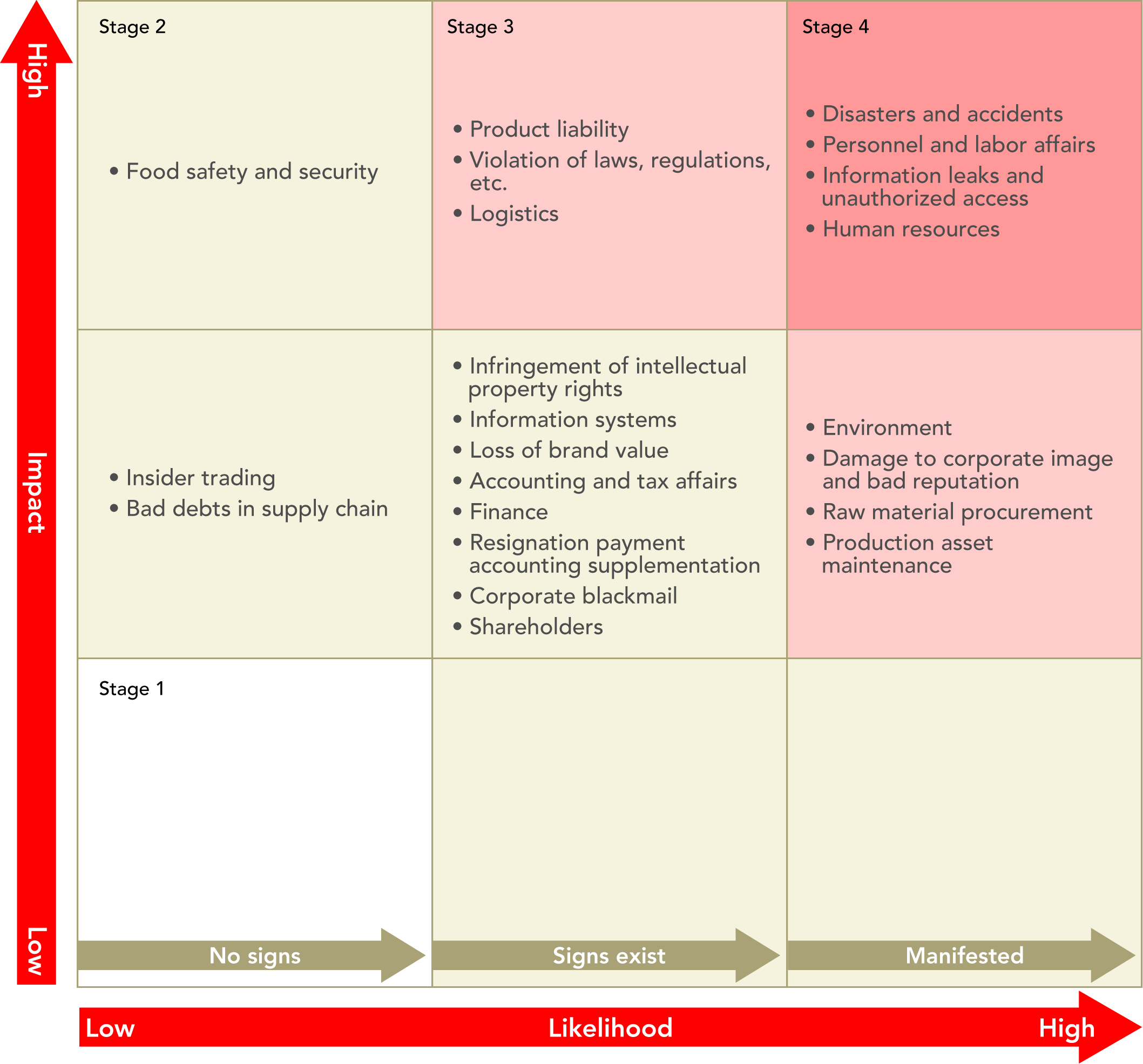Risk Management
Policies
Of late, the business environment changes significantly and the
types of risks in business activities span a broad range. The
NISSIN FOODS Group properly understands all kinds of internal and
external risks and works to prevent risks from manifesting and
mitigate damage when they do to seek sustainable growth while
protecting corporate value.
For risk management, we aim to meet the expectations of a wide range
of stakeholders, and our basic policy is to build a resilient corporate
foundation.
Structure
Risk Management Structure
The NISSIN FOODS Group has put in place a Comprehensive Risk
Management Committee chaired by the Executive Vice President/COO
to prevent, identify, manage, and address a wide variety of
risks. Based on the NISSIN FOODS Group Code of Risk Management,
the risk management departments take on the role as secretariat,
and persons responsible for risk measures are appointed at major
NISSIN FOODS HOLDINGS departments as well as at Group companies
in Japan. Besides managing risks in an integrated manner, the
Comprehensive Risk Management Committee instructs major NISSIN
FOODS HOLDINGS departments and business corporations to identify
hidden and manifested risks in our value chain and to establish
mechanisms to prevent risks and minimize damage. If an event
occurs and has a severe impact on the Group, the chairperson of
the Comprehensive Risk Management Committee sets up a Group
serious incident taskforce headed by the CEO to quickly address
the incident and put forward measures to prevent a recurrence.
In addition, product accidents, business continuity planning (BCP),
compliance, and information security are positioned as our four key
risks, and each key risk has its own committee to study the mitigation
of manifested risks and measure to prevent risks. Risks related to
the environment and safety are addressed by establishing the Environment
Working Group established under the Sustainability Committee, and
the Environment Working Group collaborates with the Comprehensive
Risk Management Committee to manage and reduce risks.
To manage Group-wide risks, the Group undertakes early discovery of risks and proper response to them based on the framework of the Three Line Model*. We identify, analyze, and evaluate Group-wide risks to understand the risks to prioritized by the Group and build systems that generate self-discipline within our organizations.

- *
A model that proves that the governing body, management, and internal
audit play three key roles in governance
First line: Business divisions (including associates in Japan and overseas)
The first line carries out daily operations based on stipulated regulations and internal procedures. Regarding risks and such accompanying the execution of duties, independent governance activities (identification, evaluation, management, and control of risks and such) are conducted as the risk owner.
Second line: Comprehensive Risk Management Committee as well as departments for risk management, compliance, and information security
The second line monitors, measures, and evaluates the independent governance activities undertaken by the first line, and at the same time, has the responsibility of formulating and promoting basic policies related to risk management and governance of compliance.
Third line: Internal Auditing Division
The third line evaluates the activities of the first and second lines from an independent position as well as provides advice and undertakes correction to ensure effectiveness of risk governance.
Risk Management Process
The Group annually creates a risk map—with likelihood and impact
as the two axes—based on the results of interviewing presidents
and chief officers of the Group’s business corporations
regarding the state of risk management. In the risk map, each
risk is assessed and classified into one of four stages to
identify important risks. For each identified risk, specific
policies are stipulated and measures are implemented in an
effort to reduce the risk. In particular, for risks that have
high Group-wide impact and span several departments, we
establish subcommittees comprising staff from the relevant
departments for monitoring of the management state and
implementing responses. In addition, the management state of
each risk and the effects of risk measures are reported annually
at meetings of the Board of Directors.
In FY 3/2024, disasters and accidents, personnel and labor affairs,
information leaks and unauthorized access, and human resources were
identified as four key risks.
FY 3/2024 Risk Map
| Category | Subcategory | |
|---|---|---|
| (1) Product liability | ① | Product liability (product accident) |
| ② | Food safety and security | |
| (2) Business continuity plan | ③ | Disasters and accidents |
| (3) Compliance | ④ | Violation of laws, regulations, etc. |
| ⑤ | Insider trading | |
| ⑥ | Personnel and labor affairs | |
| ⑦ | Infringement of intellectual property rights | |
| (4) Information security | ⑧ | Information leaks and unauthorized access |
| ⑨ | Information systems | |
| (5) Environment | ⑩ | Environment |
| (6) Reputation | ⑪ | Loss of brand value |
| ⑫ | Damage to corporate image and bad reputation | |
| (7) Finance and accounting | ⑬ | Accounting and tax affairs |
| ⑭ | Finance | |
| ⑮ | Resignation payment accounting supplementation | |
| (8) Corporate | ⑯ | Human resources |
| ⑰ | Corporate blackmail | |
| ⑱ | Shareholders | |
| (9) Supply chain management | ⑲ | Raw material procurement |
| ⑳ | Production asset maintenance | |
| ㉑ | Logistics | |
| ㉒ | Bad debts in supply chain | |

Expected Risks and Mitigation Measures
| NISSIN FOODS Group risk category | Type of risk and acceptable range | Response to risk |
|---|---|---|
| Human resources |
|
|
| Information leaks and unauthorized access |
|
|
Annual Securities Report (Business and Other Risks) p.36 [PDF 8.3MB]
Emerging Risks
Risks that are expected to have severe long-term impact on the Group’s business activities—and which have yet to manifest but may appear in the future depending on changes in the external environment—are positioned as emerging risks. The Group evaluates medium- to long-term (three to five years or more) impact to business and responds to emerging risks.
Emerging Risks Related to the International Situation and Their Countermeasures
| Explanation of risks | The worsening of relations and heightening of tension between countries—against a backdrop of political, social, military, and cultural factors around the world—may impact companies’ business continuity. In particular, the risks related to the international situation in the regions listed below may have severe impact on business continuity by disrupting the Group’s supply chains (paralyzing commercial logistics) and causing delays in procurement and the implementation of production strategies. They are therefore recognized as emerging risks.
|
|---|---|
| Impact to the Group’s business activities |
|
| Risk countermeasures |
|